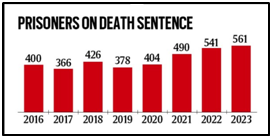The Annual Death Penalty Report 2023
10-02-2024
09:05 AM
1 min read

What’s in Today’s Article?
- Why in News?
- Highlights of the Annual Death Penalty Report 2023
- Key Takeaways from the Findings of the Annual Death Penalty Report 2023
- Recent Developments with respect to Capital Punishment

Why in News?
- According to the Annual Death Penalty Report 2023, appellate Courts in India - SC and all the HCs together - confirmed only one death sentence in 2023 while the rest were either commuted or saw the prisoners acquitted altogether.
- The Report (‘Death Penalty in India: Annual Statistics 2023’) was prepared by Project 39A, a criminal justice programme linked with the National Law University, Delhi.
Highlights of the Annual Death Penalty Report 2023
- Only one death sentence was confirmed by a High Court (the Karnataka HC in a murder case) in 2023, marking the lowest rate by the appellate courts since 2000.
- In 2022, HCs confirmed the death sentences of four convicts, five in 2021 and three in 2020.
- The dip was steep after 2019 when HCs confirmed death sentences of 26 convicts.
- This year (2023) also saw the Supreme Court not confirming any death sentences, the second time since 2021.
- There has been a 15% decrease in the rate of disposal of death penalty confirmation proceedings at the HCs in 2023.
- 57 death penalty cases were disposed of in 2023, compared with 68 cases in 2022.
- This significant decline in the case disposal rate of death penalties is attributed to the high death row population in the country.
- There was a 45.71% increase in the number of prisoners under death sentence by the end of December 2023, from that in 2016.
- With 120 death sentences (167 in 2022) imposed by trial courts and 561 prisoners under the sentence of death by the end of December, 2023 had the highest number of prisoners on death row in nearly two decades.
- Similar to the last five years, the majority of death penalty cases in trial courts involved crimes related to sexual offences.
- Of the 120 death sentences imposed by trial courts, more than 50% were for homicidal rapes.
Key Takeaways from the Findings of the Annual Death Penalty Report 2023
- Under Section 366 of the Code of Criminal Procedure (CrPC), all death sentences awarded by trial courts are to be confirmed by the concerned HCs.
- Both the conviction and the quantum of sentence are examined by the first appellate court (HCs).
- Acquittal and remand by the SC and HCs in 2023 indicate significant concerns with the quality of police investigations and appreciation of evidence by lower courts in cases.
- For example, in acquitting six prisoners in five cases and remanding two cases involving two prisoners, the SC criticised negligence in investigation and trials.
- In one particularly grievous case, it found that the prisoner had been a minor at the time of the offence, 28 years after his imprisonment.
- The trial courts-imposed death sentences in 86.96% of its cases in the absence of any information relating to the accused, despite the SC’s mandate in Manoj v. State of Madhya Pradesh (2022).
- In this case, SC mandated the Trial Courts to collect psychiatric and psychological evaluation reports of the accused before awarding the death sentence.
Recent Developments with respect to Capital Punishment
- Recently, Ghana (where the Parliament passed a Bill to abolish the death penalty for ordinary crimes) and Malaysia (eliminated the mandatory death penalty for 11 criminal offences)are some of the international developments in death penalty laws.
- However, in India, the passing of the Bharatiya Nyaya Sanhita (BNS) 2023 would increase the number of offences punishable by death from 12 under the Indian Penal Code (1860) to 18 under the Act.
Q1) What is the Bharatiya Nyaya Sanhita (BNS) 2023?
The Bharatiya Nyaya Sanhita (BNS) 2023 is the criminal code of India, and which will replace the Indian Penal Code (IPC) 1860. The BNS covers all aspects of criminal law, including offences, punishments, defences, and procedures.
Q2) Who can pardon a death sentence in India?
Under Article 72, the President can grant pardons, reprieves, respites or remissions of punishment or suspend, remit or commute the sentence of any person convicted of any offence in all cases of death sentences.
Source: In 2023, HCs heard cases of 80 on death row, confirmed one | TH


